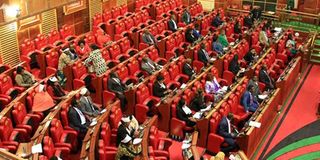MPs mull steps to take after foiled perks plan

The National Assembly during a past session. PHOTO | FILE | NATION MEDIA GROUP
What you need to know:
The MPs now have a daunting task of marshalling at least two-thirds majority or 233 of the 349 members in the National Assembly to overturn the presidential memorandum.
President Kenyatta’s argument is that the review of allowances does not take into account or make reference to the role of SRC.
The clause further sought to provide for the facilitation of activities held outside the precincts of Parliament by members and staff of parliament.
MPs are mulling steps to take next after President Kenyatta declined to sign the Parliamentary Service Bill, 2019, which sought to enhance their domestic and foreign travel allowances.
In a memorandum of August 16, 2019, sent to the National Assembly yesterday, the President noted that signing the bill passed on July 4 into law, violates the Constitution as the proposal of allowances did not have the input of the Salaries and Remuneration Commission (SRC).
BENEFITS
SRC chaired by Ms Lyn Mengich is constitutionally mandated to regularly evaluate and review the remuneration and benefits of all State and public officers.
“In view of the foregoing, I recommend that the clause be deleted,” President Kenyatta says in the memo. He now wants the Parliamentary Service Commission to do this with the advice of the salaries commission.
The MPs now have a daunting task of marshalling at least two-thirds majority or 233 of the 349 members in the National Assembly to overturn the presidential memorandum.
If it happens, it will be the first time to marshal the numbers to veto the President’s text in the history of the Kenyan parliament.
Clause 20 (2) of the rejected bill, provided that PSC shall regularly review the domestic and international travel allowances applicable to the members and staff of Parliament.
President Kenyatta’s argument is that the review of allowances does not take into account or make reference to the role of SRC.
The clause further sought to provide for the facilitation of activities held outside the precincts of Parliament by members and staff of parliament.
This would have effectively seen taxpayers pay for the MPs’ caucuses as well as their parliamentary group meetings held outside Parliament.
The President also stopped a proposal that would have given PSC the powers to remunerate parliamentary employees after every three years as contained in clause 43 (1) of the bill, which the President’s memo faults for not taking into account the advisory role of the SRC.
The clause sought to empower PSC to determine the review cycle of remuneration and allowances of its employees.
In rejecting the MPs push for enhanced allowances, the president has in effect politically emboldened the powers of the salaries commission in executing its duties.
The commission has had a fair share of tiffs with MPs and is already in court to challenge the decision of PSC to award the 416 legislators in the National Assembly and Senate, a monthly housing allowance of Sh250,000 before tax.
The allowance was paid to the 416 MPs in lump sum early this year and backdated to October 5, 2018, when the High Court ruled that MPs just like other State Officers are entitled to a housing allowance.
The case was filed by the Deputy Governors, who argued that they are entitled to a House or a housing allowance opening the doors for the MPs to also stake their claim to the allowance.
MPs juts like the president, his deputy, county governors, Cabinet Secretaries, Principal Secretaries, members of constitutional commissions and independent offices are also state officers.
The commission also slammed brakes on the Sh18,000 night allowance to MPs after the housing allowance was blocked by the courts.
The night out allowance was to cater to the MPs accommodation when attending to parliamentary business in Nairobi away from their constituencies.





